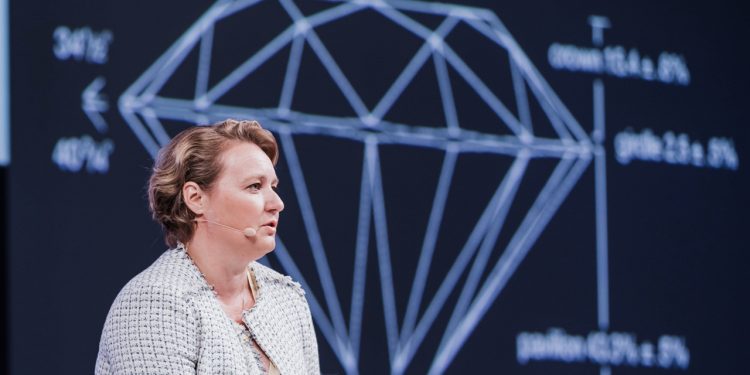About $15 billion rough diamonds are extracted from the mines yearly. Their value multiplies after processing, clocking $47 billion in trade, and more so in retailers’ hands at $72 billion before they are even set into rings.
While the supply chain is relatively simple and returns are high, many stakeholders are deterred by the high costs and risks involved.
“The industry at its very heart is suffering from a global financing crisis, it’s suffering an identity crisis and more so than ever it cannot rely on the gentleman’s handshake and the promise to pay in the mechanism of trust,” said Leanne Kemp, founder and CEO of Everledger.
Three years ago, Leanne entertained the thought of bringing transparency to the diamond industry, which in her own words, has had “its own fair share of romance and tragedies”.
This gave birth to digital solution provider Everledger, which tracks and protects items of value. Based in London, it currently employs 45 people across six locations worldwide.
“We now know when diamonds are being sold and resold on marketplaces like Amazon and eBay, and Everledger works with insurance companies on fraudulent claims, with banks to help them finance the diamond pipeline more efficiently, and with crime resources so we can be sure that diamonds are not crossing borders and entering into black markets,” explained Leanne.
She was speaking to some 140 participants as a panellist at IBM Singapore’s “Women Leadership in the Digital Economy Forum” on 8 May 2018.
Business Raison d’etre
The business idea stemmed from Leanne’s aim to inform purchasers of the story behind every valuable through records of its source, transit footprints and more.
Everledger’s “digital vault” is underpinned by IBM’s blockchain and infrastructure technologies. It captures 40 data points such as laser inscription, measurements and specifications. It also partners with certification houses to digitally store certified diamonds on its platform.
Leanne shared: “We are interested in rising asset classes – watches, arts, jewellery, wine… So, quite secretly, it’s a motivation for me to get out of bed every morning for something I like to drink, watch, wear and buy.”
Trust in Tech
With the blockchain technology, it is now possible to create a circle of trust for people to share and transact. At present, blockchain is commonly applied in finance and cryptocurrencies and still new to physical assets.
At the panel discussion, speakers suggested several uses for blockchain such as tracing the origins of food and finding out if they are organic, tracking goods in transit, and making medical records portable.
Blockchain is also useful for people who want to eliminate paperwork, make certain data accessible or have transactions that take place over a long period of time or involves a number of participants.

